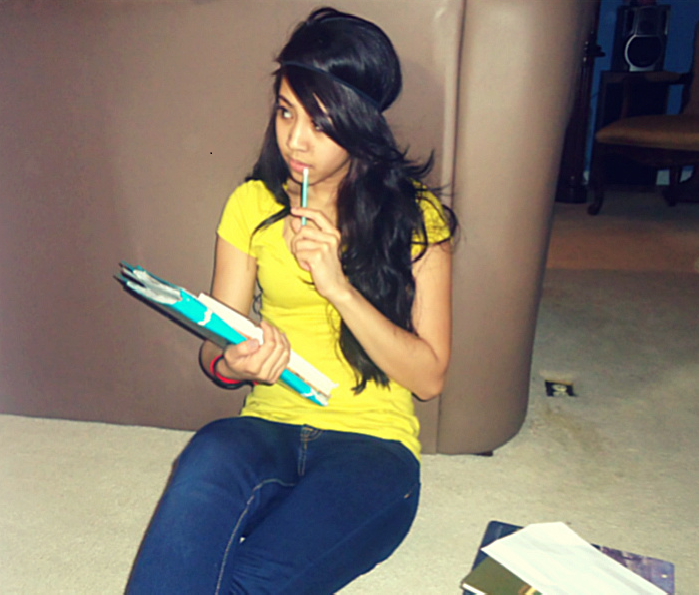Do you have a writer in the house? Do you live in or near Atlanta, GA? Consider signing your child up for Ms. Scribbles’ Summer Writing Workshop! We’ll start with a 1/2 day writing camp to kick things off. There will also be an end-of-summer reading where writers can reconvene and read aloud what they wrote, revised and polished to perfection over the summer. Writers will also have their work published in the 2013 Summer Anthology. Deadline for Early Bird Registration: May 1. Click here for more details: Summer Writing Workshop.
Poetry takes many forms, as proved by one of my very talented students, “Dr. Dimonds.” Check out his song “Diamonds on My Feet” on YouTube:

“Herobrine gets me ready for a new fight
I hit the crafting table, go and start a new quest
You in your house getting pork in my wooden chest
I’m in the mine getting ore with a diamond vest
Young minecrafter, coal in my pockets
I got a mine filled with whole diamond sockets.”
(I think the lyrics probably make sense if you have played the video game Minecraft before. ) Nice writing, Dr. Dimonds!
And it’s not. Kenneth Bernstein recently explained his opinion on the problems with No Child Left Behind, with regard to writing and testing, in Academe: “Students arriving in our high school lacked experience and knowledge about how to do the kinds of writing that are expected at higher levels of education…The AP course required that a huge amount of content be covered, meaning that too much effort is spent on learning information and perhaps insufficient time on wrestling with the material at a deeper level.”
In Ms. Scribbles Workshop, the student is encouraged to wrestle with the material at a deeper level, which will lead to the kind of writing that is expected at higher levels of education.
Aristotle said: “Tragedy is the representation of an action that is complete and whole and of a certain magnitude. A whole is that which has a beginning, a middle, and an end.”
Flannery O’Connor said: “In a story something must happen.”
According to these definitions, I think we can call this message, which came today in an email from a student, a story:
Dear Ms. Scribbles, I got a popcorn kernel stuck behind my tonsil. I got it out by having 3 pieces of pizza and 2 pieces of chocolate pie!
Feels complete to me, and I was entertained!
I became a mean teacher this week. I told my seventh graders that, from now on, if someone turns in a paper without a name, or an assignment that isn’t stapled, it will be placed in my “circular file.” None of them knew what that meant. When I enlightened them and explained that assignments that go in the “circular file” get an automatic zero, they objected, finding the new policy draconian.
“But there are 20 of you,” I explained. “Your class always has more than one assignment to turn in. Assignments often take up more than one piece of paper. That means this class is sometimes giving me 60 pieces of paper at once! It takes forever to figure out who the nameless papers belong to and to match up pieces of paper correctly.”
I told them that naming papers and stapling assignments is a way of taking someone else into consideration, namely – me, their (formerly beloved) Ms. Scribbles!
It is a learning opportunity. Children are naturally self-centered. Becoming aware of other people and taking their needs into account is just a natural part of growing up. We call this “putting ourselves in other people’s shoes.”
This is a mental habit that is especially important for a writer. Young writers often write as if other people share their same brain, their same past, their same experiences, and their same body of knowledge. By “putting yourself in the reader’s shoes,” you begin to anticipate what a reader might need to fully understand what you are trying to say.
Providing helpful information, in the form of background or context, is almost always necessary, but it’s sometimes difficult to do. It can “bog down” the paper if it’s not done in a clean way. Appositives can be one of the most helpful tools when it comes to injecting a piece of writing with helpful information.
Dorothy, a farm girl who dreams of a better life, finds herself in a mysterious land called Oz.
I met her while I was traveling in Tunisia, a small country in North Africa.
Despite having very different backgrounds, Ron and Hermione both end up at Hogwarts, a school for witchcraft and wizardy.
Appositives allow the reader to get a toehold without wading through a whole paragraph of isolated background information. Use them liberally!
Details are important for all kinds of writing: creative, persuasive, and expository. We tell young writers that good writing “has a lot of details.” When you ask someone why they liked a certain book, they often say things like “because it was very detailed” and “it made it feel like you were there.” But what does that mean? What is a detail? As a writing teacher would say, “Could you be more specific?”
One thing you can do is explain to young writers that “details” fall into four main categories: description, definition, explanation, and information. Spend some time talking about each one and why and how each one can be important or effective. Show some examples of each . Once they begin to see that there are different kinds of details, they can start asking themselves which kind might be needed, useful, or effective in a certain paragraph or piece of writing.
My 9th grade students have introduced me to memes and have written a few of their own based on our reading this semester. This is one of my favorites, written about Penelope, wife of Odysseus in The Odyssey. I rather like Penelope (she’s so much better than that dreadful Helen of Troy) but clearly, some disagree with me.
Okay, so maybe you have to read The Odyssey to get it. Anyway, thanks, Jim!
I received an email yesterday from a grandfather who homeschools his grandson. He said, “Your program looks interesting, but I don’t understand exactly what you do.” I watched a TED Talk recently called “How to Build Your Creative Confidence” and thought it was highly relevant to what I do in my workshop.
In the TED talk, CEO David Kelly explains that we need to start seeing all people as naturally creative. He believes (as I do) that creativity is not the special domain of a precious, gifted few. Kelly helps people from all walks of life conquer their fear of creativity using a process called “guided mastery.” It was was developed by Albert Bandura, one of the most influential psychologists of all time. The idea is that if you guide people through a series of steps that allow them to experience small successes, they will gain confidence and “self-efficacy,” which means “a person’s belief in his or her ability to succeed in a particular situation.”
The step-by-step process I use in workshop works in much the same way. By breaking down the writing (creative) process into simple steps, students can experience daily successes and develop an attitude of: “I can do this!”







